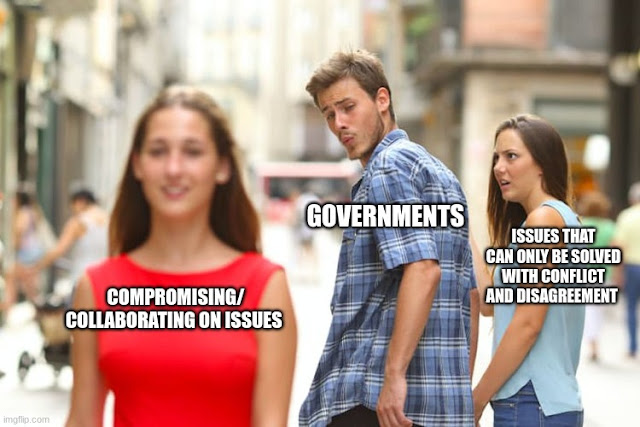Final Portfolio: the end
Here is my final portfolio for Business and Organisational Communications. I have included 5 of my favourite free creations that create a coherent voice and showcase what I have learnt this year!
In the popular TV series Breaking Bad, there are a lot of power and business struggles. Breaking Bad is the tale of a high school science teacher (Walter White) turned meth cook, who works with different people in illegal circumstances in the drug world.
In later seasons of the show, Walt works with Gus (depicted above in the meme). Gus Fring controls the output and distribution of Walt's meth. Gus is Walt's 'formal authority' and is in a high ranking position in the drug business.
Walt has some formal authority, but not as much as Gus. Walt's source of power comes from the knowledge of drugs that he has. He is a meth making expert, which gives him power over Gus. Gus depends on Walt's expertise and knowledge about meth making. Walt is the expert of the product, while Gus is the owner of the business that sells the product. Both men have a unique source of power.
2. Pain free stress free relief: an infomercial for stress free conversations
Identify. Prepare. Practise: these are 3 ways to prepare for (or even avoid) stressful conversations, according to Chapter 10 of HBR's 10 Must Reads.
This reminds me of DEAR MAN, a classic DBT conflict resolution and communication technique that has a little bit more finesseeee. DEAR MAN stands for: Define, Express, Assert, Reinforce, Mindful, Assertive, Negotiate. In layman's terms, DEAR MAN is a communication strategy that promotes expressing your objectives and feelings, while also preserving the feelings and objectives of others.
This frame work is helpful because it helps all types of communicators.
When faced with stressful conversations, some people crumble and let the other persons emotional response manage the outcome of the conversation. Some people are overly aggressive and let their emotions and objective control the narrative of the conversation. Everyone has their own communication issues, but DEAR MAN is a great strategy that covers many bases, including some of the points that the chapter lacks.
Thanks to my therapist and my DBT (Dialectical Behavioural Therapy) Workbook- these skills will never die.
3. Human Relations: happiness in the workplace isn't pointless
(this is my Mom and I) (my Mom works at IKEA)
The concept of 'Human Relations' appeared in the workplace after the industrial revolution. The industrial revolution changed the way labour was divided in workplaces, while also making workers feel like rusty cogs in the industrial machine. It was apparent that business owners did not care about workers connection, work satisfaction, and happiness in the Industrial revolution.
Today, we know that peoples connections, work satisfaction, perceived importance of work are key factors in productivity levels. People who feel like they are important and appreciated are more likely to do a good job at work. Compared to the workplace atmosphere of the Industrial revolution, the encouraged treating workers like cogs in the wheel of productivity, Human Relations creates different model of work.
My Mom works at IKEA. This is a huge chain business that has a (overall) good Human Relations department.They announce staff birthdays on a loudspeaker during break, give out great benefits and try to build a community. People 'in charge' listen to the concerns of the staff.
When my Mom had to work weekends and was feeling really unhappy because she missed her family, IKEA listened and didn't give her any more weekend shifts. They told her that they wanted her to be happy at IKEA. Listening to my Mom and caring about her happiness had an impact on her choice to stay with IKEA, and her overall job satisfaction. IKEA is far from a perfect business, however, my Mom's experience has been a positive one, and is a good example of how the existence of Human relations benefits both the worker and the employer.
4. Organisations as communication systems: the manager's unexpected journey
Unfortunately, The Journey of 1000 Steps does not live up to its name. It turns out that you do not need to take a physical journey of 1000 steps, instead it is a metaphorical journey that describes the various technological and systematic changes that should happen to manage your business's communication and information management.
I can't speak for everyone, but I know that I would rather climb the highest mountains and swim in the depths of the darkest seas to find the perfect information management system- but the world we live in is a real let down.
The Journey of 1000 steps is apart of the '10 principals of successful information management' found in the chapter Organisations as Communication Systems in the Organisational Communications Text. Information management refers to the business processes and practises of managing information. An example could be Content or Document Management, Records Management, Employee Records, and many more. Information Management systems should make storing and finding information a seamless communication process, hence the chapter title: Organisations as Communication Systems.
The main idea behind information management systems is to create better organisation and ease of communication. At my place of business, everything is Microsoft based. This makes sending documents, files and emails, all very easy because everything is compatible. There used to be multiple information systems at my work, which made it harder to communicate with people and get things done. Now, after some stragglers have finally gotten on board with using the same communications system, things run smoother.
Over all, information management is a pretty boring topic, but it is important.
5. Unterschieden an der Arbeitsplatz
Student Exchange 2018-2019
*Context for free creation in German*
In 2019, I lived in Germany as an exchange student. In this time, I became proficient in German, learned about German culture and has tons of fun being away from home.
Besides the obvious things I learned and did on my trip, I also gained a new understanding of cultural and linguistic differences. German culture shapes the German language- and German language shapes the German culture. I learned that in order to understand the Germans- you have be proficient in German language and culture- It is one thing to say a google translated sentence verbatim, it is an entirely different thing, to understand the ebbs and flows of cultural differences.
Since the chapter is about encountering differences in the workplace, I wanted to write my free creation in German to create a literal communication difference. I know, from my own experience how cool cultural differences are.
Heute, ich spreche uber die Theme: Unterschieden an der Arbeitsplatz. Zum wissen die unterschieden in deine Arbeitsplatz ist so wichtig, weil jeder kulture eine underschieden sprechen modellen hat.
Wann sie, eine reiches und erfolgreich Geschäftenhaber sind, sie müssen zum kultur, unterschieden, und kommunication uberwissen haben.
Wann Man eine gute verstanden von andre Kulturen, Sprachen, und Landen hat, dann Man kanst gute Weltumspanne vertrag gemachen. Weltweit beschäftigungen ist ein wirkliches Moglichkeit.
Firmen machen sie sich selbst weltweit.
Zum beispeil, die Text redet auf ein geschicht von Chevy in Puetro Rico. Chevy hatten eine Campain genennt: 'Nova.' Die Firma hat keine Idee, dass Nova 'es geht nicht' auf Spanisch gemeinte. Doch, sie haben ein Campain das wirklich 'geht nicht.' Produckt vernamen ist einfaches Kommunication.
Ich hab diese Blog ganz auf Deutsch geschibt weil ich eine wirkliches Kommuncation unterschieden machen. Ich weiß, aus meine selbst erfahrungen wie wichtig (und kool) Kultur-Unterschieden sind.







Comments
Post a Comment